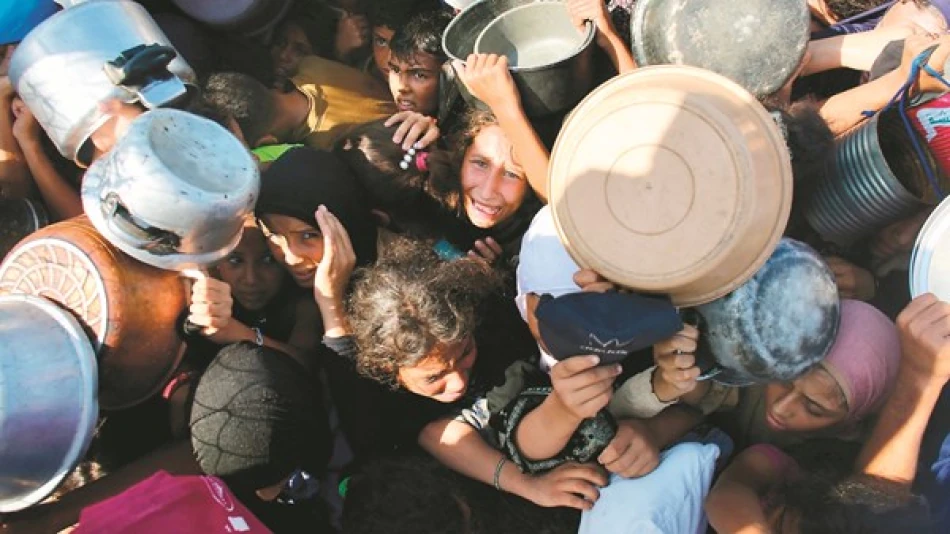
Urgent Call for Action: Combating the Spreading Famine Crisis in Gaza
Gaza Faces Manufactured Famine as Relief Organizations Sound Global Alarm
Over 100 humanitarian and rights organizations have issued an urgent joint appeal calling for immediate government action to address the spreading famine in Gaza, where tons of food, water, and medical supplies remain blocked outside the territory while aid workers themselves now join food lines alongside the populations they came to serve. The unprecedented coalition warns that Israel's restrictions have created a man-made humanitarian catastrophe that demands immediate international intervention.
Aid Workers Now Victims of the Crisis They Came to Solve
The statement, signed by 111 organizations including Mercy Corps, the Norwegian Refugee Council, and Refugees International, paints a stark picture of humanitarian collapse. Relief workers who entered Gaza to provide assistance now find themselves competing for the same scarce food resources as local residents, risking bombardment simply to feed their own families.
"Humanitarian organizations are watching their colleagues and partners wither before their eyes," the statement reads, highlighting how the crisis has evolved beyond affecting just Gaza's civilian population to encompassing the entire humanitarian infrastructure.
Complete Supply Depletion Creates Operational Paralysis
The Norwegian Refugee Council reported that aid stocks have been completely exhausted in Gaza, with some of their own staff now facing starvation. This represents a critical breakdown in humanitarian operations—when aid organizations can no longer maintain basic functionality, the entire relief system collapses.
The situation marks a departure from typical humanitarian crises where aid organizations, despite facing challenges, maintain some operational capacity. The complete depletion of supplies suggests a level of access restriction rarely seen in modern conflict zones.
Systematic Restrictions Create Artificial Scarcity
The organizations point to a fundamental contradiction: while Gaza's population faces widespread hunger, substantial quantities of food, clean water, medical supplies, and other essential materials remain stockpiled outside the territory. This artificial scarcity, they argue, results directly from Israeli restrictions on humanitarian access rather than an actual shortage of available aid.
Israel's complete cutoff of supplies to Gaza, implemented in March, has created what the organizations describe as "chaos, famine, and death." The timing and scope of these restrictions distinguish this crisis from previous periods of limited access, representing what appears to be a comprehensive siege.
International Response Framework Under Pressure
The coalition calls for governments to demand the lifting of all restrictions, opening of all land crossings, and restoration of "principled, UN-led humanitarian response" throughout Gaza. This appeal reflects growing frustration with existing diplomatic channels and suggests that traditional humanitarian frameworks may be inadequate for addressing the current crisis.
The emphasis on "concrete measures" indicates that previous international responses—likely consisting of diplomatic statements and behind-the-scenes negotiations—have failed to produce meaningful change in humanitarian access.
Implications for International Humanitarian Law
The systematic nature of the restrictions raises significant questions about compliance with international humanitarian law, which requires parties to conflict to allow and facilitate rapid humanitarian relief for civilian populations. The complete nature of the supply cutoff, combined with restrictions on humanitarian organization access, suggests potential violations of these legal obligations.
For the international community, the crisis presents a test case for the effectiveness of humanitarian protection mechanisms. The failure to ensure basic access for relief operations could set concerning precedents for future conflicts where civilian populations depend on international assistance.
The unprecedented nature of this humanitarian breakdown—where aid workers themselves become victims requiring assistance—signals a potential shift in how conflicts affect humanitarian operations, with implications extending far beyond Gaza's borders.
Most Viewed News

 Layla Al Mansoori
Layla Al Mansoori






